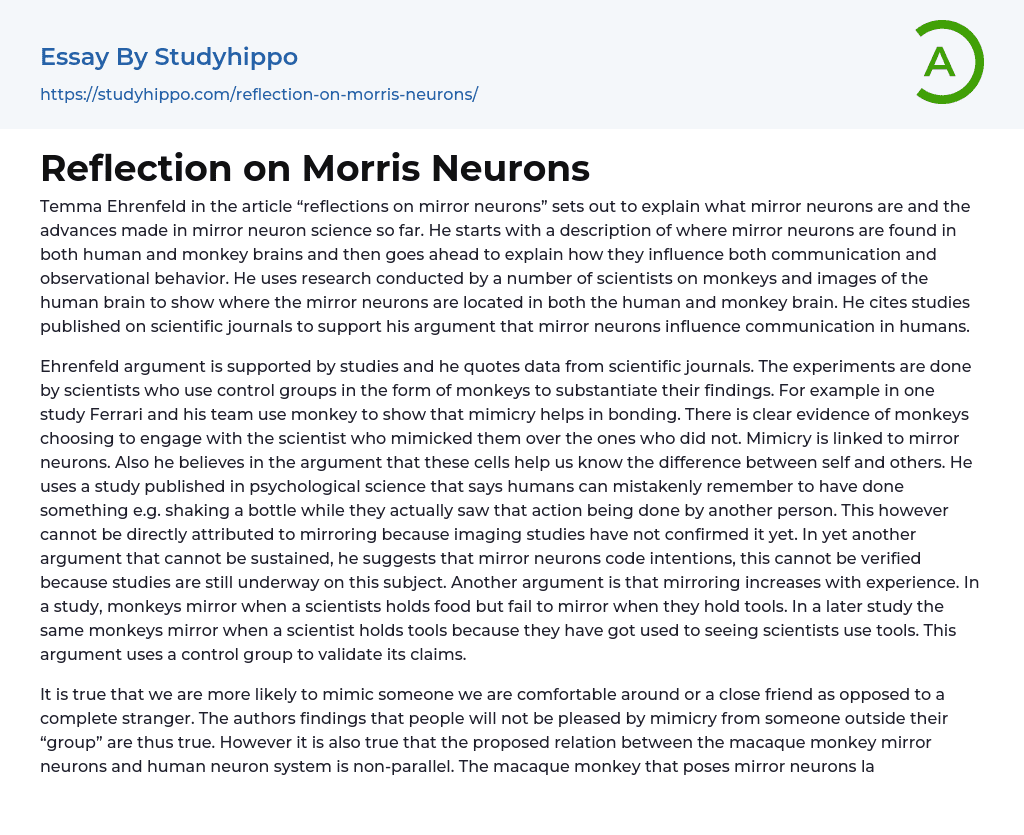Temma Ehrenfeld, in the article "Reflections on Mirror Neurons," discusses the concept of mirror neurons and the progress made in mirror neuron science. Ehrenfeld begins by explaining the location of mirror neurons in both human and monkey brains and their impact on communication and observational behavior. The author presents research from various scientists and visual representations of the human brain to illustrate the placement of mirror neurons in both species. Ehrenfeld supports their argument with studies published in scientific journals that demonstrate the influence of mirror neurons on human communication. The author emphasizes the use of control groups, specifically monkeys, in these experiments to validate the findings.
For instance, Ferrari and his team conducted a study using monkeys to demonstrate the role of mimicry in fostering bonds. The study provided compelling evidence that monkeys preferentially interacted with
...scientists who imitated their actions, as opposed to those who didn't. Mimicry is closely connected to mirror neurons, which are believed to aid in distinguishing between oneself and others. Additionally, Ferrari references a study published in psychological science that suggests humans can erroneously recall having performed certain actions.
The text discusses several arguments related to mirror neurons. First, the author mentions that some people believe that mirror neurons can be responsible for individuals shaking a bottle after observing someone else perform the action. However, this theory has not been confirmed by imaging studies yet.
Next, the author disputes the idea that mirror neurons code intentions. This claim remains unverified as ongoing studies are still being conducted on this topic.
Furthermore, the text mentions a study involving monkeys. The monkeys were observed to mirror the actions of a scientist when
they held food, but not when they held tools. However, in a subsequent study, the same monkeys mirrored the scientist's actions with tools, indicating that their mirroring behavior increased with experience and familiarity.
The argument employs a control group to support its assertions. Indeed, individuals tend to imitate those they are familiar with or close friends, rather than someone they do not know. As a result, the authors' conclusions regarding people's disapproval of mimicry from outsiders are accurate. Nevertheless, it should be noted that the comparison made between macaque monkey mirror neurons and the human neuron system is not equivalent. The macaque monkey's mirror neurons lack certain advanced cognitive functions found in humans, such as imitation, language, or empathy.
The author suggests that if mirroring can aid stroke victims, then it can effectively assist soldiers injured in war for rehabilitation. This technique can help them regain motor abilities and improve communication. The heightened mirroring activity in their brains can be linked to specific actions that serve as a form of communication. Despite the inevitability of such injuries in confrontational circumstances, mirror neuron science offers potential assistance.
War heroes often suffer from severe injuries, and it is crucial to provide assistance to them and their families during their adjustment to this challenging situation. The process of writing this paper has presented obstacles as it involves expressing personal opinions on specific matters. Compared to previous papers, this critical thinking paper requires the incorporation of thoughts while simultaneously analyzing the author's article. In contrast, a narrative essay would not necessitate evaluating the significance of a particular text within an article.
- Acceptance essays
- Age Of Enlightenment essays
- Child Observation essays
- Confucianism essays
- Conscience essays
- Critical Reflection essays
- Destiny essays
- Determinism essays
- Empiricism essays
- Environmentalism essays
- Epistemology essays
- Ethics essays
- Ethos essays
- Existence essays
- Existentialism essays
- Fate essays
- Free Will essays
- Functionalism essays
- Future essays
- Good And Evil essays
- Human Nature essays
- Individualism essays
- Meaning Of Life essays
- Metaphysics essays
- Natural Law essays
- Personal Philosophy essays
- Philosophers essays
- Philosophy Of Life essays
- Political Philosophy essays
- Pragmatism essays
- Reality essays
- Relativism essays
- Teaching Philosophy essays
- Time essays
- Transcendentalism essays
- Truth essays
- Utilitarianism essays
- Academia essays
- Academic And Career Goals essays
- Academic Integrity essays
- Brainstorming essays
- Brown V Board of Education essays
- Brown Vs Board Of Education essays
- Coursework essays
- Curriculum essays
- Distance learning essays
- Early Childhood Education essays
- Education System essays
- Educational Goals essays
- First Day of School essays




